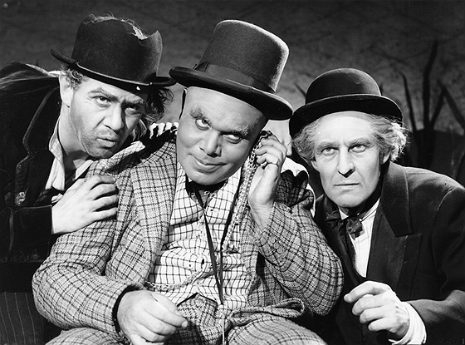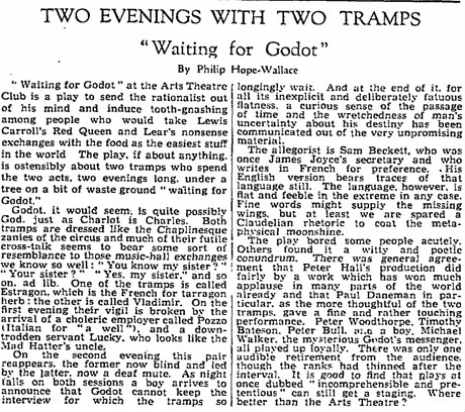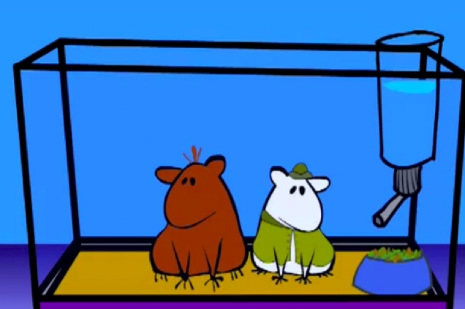
A review for Samuel Beckett’s Waiting for Godot from when the play first opened in England, at the Arts Theater Club, London, in August 1955.
Writing in the Guardian, critic Philip Hope-Wallace described Beckett’s play as “inexplicit and deliberately fatuous..” and claimed it “bored some people acutely. Others found it a witty and poetic conundrum.”
‘TWO EVENINGS WITH TWO TRAMPS
“Waiting for Godot”
By Philip Hope-Wallace
“Waiting for Godot” at the Arts Theatre Club is a play to send the rationalist out of his mind and induce tooth-gnashing among people who would take Lewis Carroll’s Red Queen and Lear’s nonsense exchanges with the food as easiest stuff in the world. the play, if about anything is ostensibly about two tramps who spend the two acts, two evenings long, under a tree on a bit of waste ground “waiting for Godot.”
Godot, it would seem, is quite possibly God, just as Charlot is Charles. Both tramps are dressed like the Chaplinesque zanies of the circus and much of their futile cross-talk seems to bear some sort of resemblance to those music-hall exchanges we know so well: “You know my sister?” “Your sister?” “Yes, my sister,” and so on, ad lib. One of the tramps is called Estragon, which is the French for tarragon herb; the other is called Vladimir. On the first evening their vigil is broken by the arrival of a choleric employer called Pozzo (Italian for “a well”), and a down-trodden servant Lucky, who looks like the Mad Hatter’s uncle.
On the second evening this pair reappears, the former now blind and led by the latter, now a deaf mute. As night falls on both seasons a boy arrives to announce that Godot cannot keep the interview for which the tramps so longingly wait. And at the end of it, for all its inexplicit and deliberately fatuous flatness, a curious sense of the passage of time and the wretchedness of man’s uncertainty about his destiny has been communicated out of the very unpromising material.
The allegorist is Sam Beckett, who was once James Joyce’s secretary and who writes in French for preference. His English version bears traces of that language still. The language, however, is flat and feeble in the extreme in any case. Fine words might supply the missing wings, but at least we are spared a Claudelian rhetoric to coat the metaphysical moonshine.
The play bored some people acutely. Others found it a witty and poetic conundrum. There was general agreement that Peter Hall’s production did fairly by a work which has won much applause in many parts of the world already and that Paul Daneman in particular, as the more thoughtful of the two tramps, gave a fine and rather touching performance. Peter Woodthorpe, Timothy Bateson, Peter Bull and a boy, Michael Walker, the mysterious Godot’s messenger all played up loyally. There was only one audible retirement from the audience though the ranks had thinned after the interval. It is good to find that plays at once dubbed “incomprehensible and pretentious” can still get a staging. Where better than the Arts Theatre?”
While the daily papers were generally negative in their reviews of the play, Kenneth Tynan was more favorable and wrote in the Observer:
By all the known criteria, Mr Samuel Beckett’s Waiting for Godot is a dramatic vacuum.
It has no plot, no climax, no denouement; no beginning, no middle and no end.
Unavoidably, it has a situation, and it might be accused of having suspense, since it deals with the impatience of two tramps waiting beneath a tree for a cryptic Mr Godot to keep his appointment with them; but the situation is never developed, and a glance at the programme shows that Mr Godot is not going to arrive.
Waiting for Godot frankly jettisons everything by which we recognise theatre. It arrives at the custom house, as it were, with no luggage, no passport and nothing to declare: yet it gets through as might a pilgrim from Mars. It does this, I believe, by appealing to a definition of drama much more fundamental than any in the books.
A play, it asserts and proves, is basically a means of spending two hours in the dark without being bored.
Not long after this review, Waiting for Godot transferred to the West End, London, and went on to win an Evening Standard award.

H/T the Guardian






